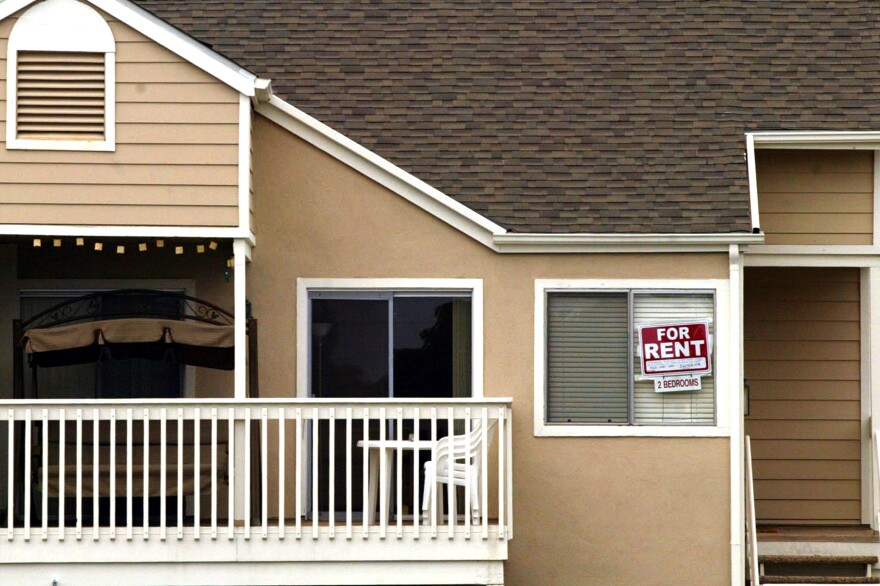At the onset of the pandemic, Norm moved back to his parents' house to be closer to them at a time when much was uncertain. He was a performer and with many theaters closing down, he was out of a job.
He hoped, like many, it would be only a couple of weeks, so he chose to keep paying for his one-bedroom apartment in Hartford.
“I wanted to have a base to tackle some of these other issues I knew I would have to [confront]. So it didn’t seem like an issue to me to use my savings to pay for the apartment,” Norm said.
He said finding an apartment was difficult enough, so he figured he would rather pay into what he already had. As weeks turned into months, he said he put several thousand dollars into rent. But when he moved back, he was hit with something his depleted savings weren’t prepared for.
“I was met immediately with a letter telling me that my rent would be increasing by $200 at the end of the month,” Norm said.
Unsure of what to do, he leaned on housing advocates, who pointed him to Hartford’s Fair Rent Commission.
“I found out that this was one recourse for some people in the state. These fair rent commissions like the one in Hartford gave you the ability to challenge what you believe to either be an unconscionable or unfair increase in rent,” said Norm. He asked that only his first name be used because he fears retaliation from future landlords.
Hartford is just one of about two dozen towns with active fair rent commissions. The mostly volunteer-based boards aim to help tenants challenge steep rent spikes. And they have the power to fine a landlord or order them to comply based on the decision. Under state law, these commissions have been optional. But that could soon change. A bill that would make them mandatory in about 45 municipalities has cleared both chambers of the Connecticut General Assembly.
“This gives tenants a way to hopefully get their rent lowered if the increase is unfair and to put pressure on a landlord to correct unsafe housing conditions that maybe violate the code,” said Sarah White, a staff attorney with the Connecticut Fair Housing Center.
White said she’s happy to see the bill clear the legislature and hopefully give renters in towns without commissions a hand. The bill would require towns with more than 25,000 residents to create a commission by July 2023.
“This is an opportunity to educate the public about these options in towns where it already exists and build really strong commissions in new towns like Middletown, Waterbury, New London and Norwich,” she said.
And they come at a time when they’re needed the most, White adds. With a hot housing market, rents have increased by more than 12% in Connecticut, and vacancy rates remain low.
“Anecdotally, I've heard from a lot of tenants who are facing a 50% increase in their rent, often for apartments that are in really poor condition,” White said. “So, if you live in a town where you don’t have a fair rent commission, you’re basically out of luck.”
Norm was one of the lucky ones. He filed a complaint with his local commission citing several reasons, including substandard living conditions. Norm said he had issues with the heat, power outages, a lack of access to parking — and more.
After a detailed hearing, the commission voted that his rent increase was unfair. And that shielded him from a rent increase for a year.
“Without this, I would have had absolutely no recourse,” he said.
Under the bill headed to Gov. Ned Lamont’s desk, the local commissions will have the power to conduct investigations, hold hearings and require people to appear at hearings among other things. Existing commissions often make decisions considering several factors, including average rents in the area, why the landlord might be requiring the increase and housing conditions — like Norm’s case.
“It’s great that we’re expanding these fair rent commissions. It worked out for me,” Norm said. “It’s something to try and help people in these desperate situations. And one drip in the bucket is better than a dry bucket.”
After his experience, he said he doesn’t want to stay in his current apartment once his pause on rent increases expires. But as he looks at affordable options in today’s housing market, he worries if commissions are enough.
“We’re gonna need a lot of things that we don’t have right now. We don’t have rent controls in this state. We don’t have enough public housing that is adequate,” he said. “We need a larger change in the ideology around housing.”





